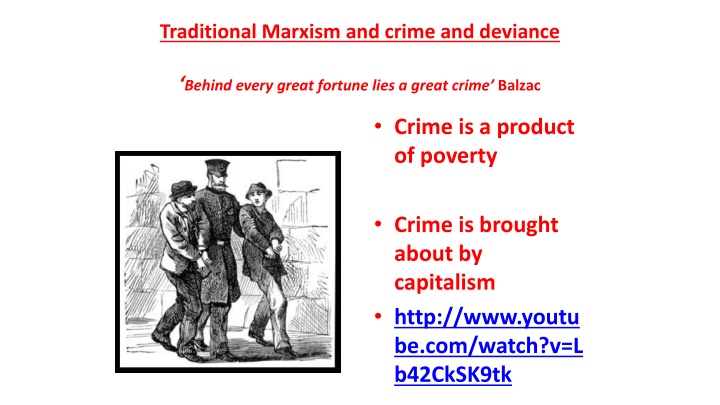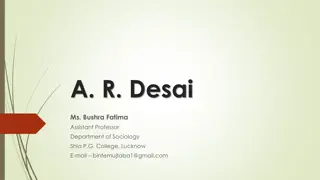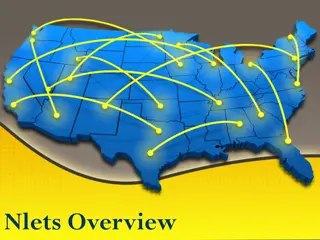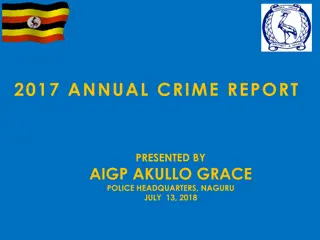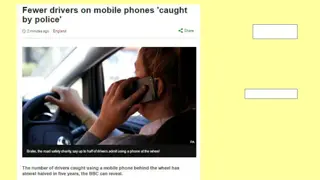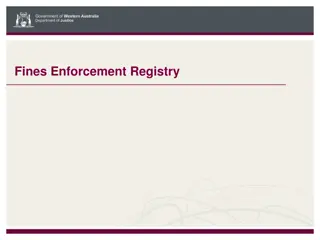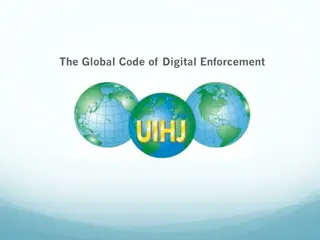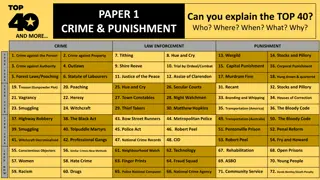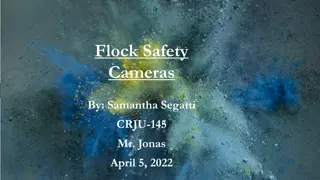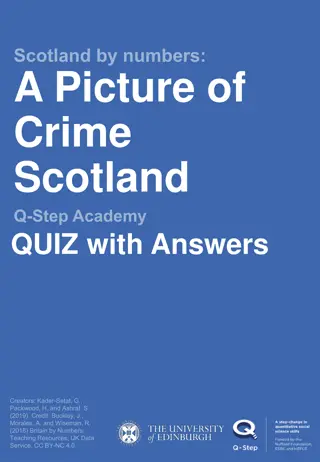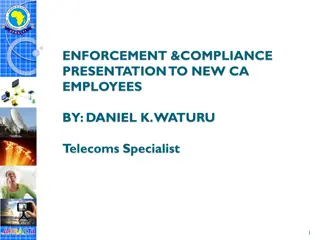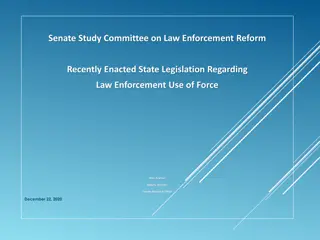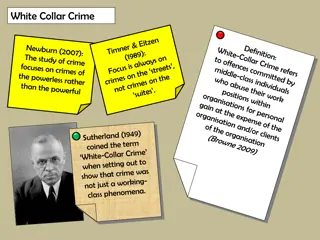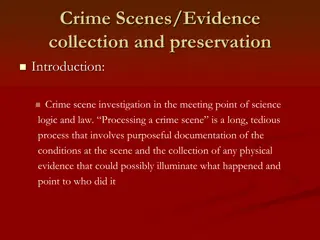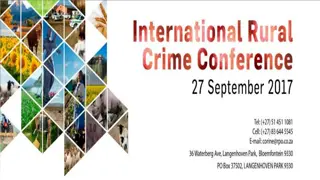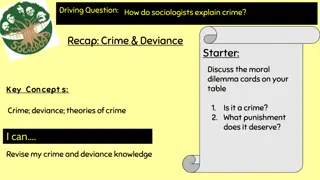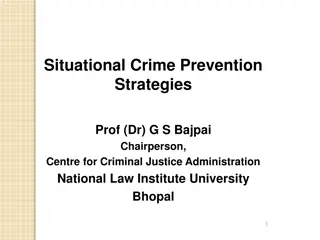Marxist Perspectives on Crime and Law Enforcement
Traditional Marxism views crime as a product of poverty and capitalism, emphasizing the manipulation of values by the powerful to maintain control. Marxism challenges the idea that law reflects the will of the people, arguing that it serves the interests of the ruling class by passing and enforcing laws that benefit them, leading to unequal treatment in law enforcement.
Download Presentation

Please find below an Image/Link to download the presentation.
The content on the website is provided AS IS for your information and personal use only. It may not be sold, licensed, or shared on other websites without obtaining consent from the author.If you encounter any issues during the download, it is possible that the publisher has removed the file from their server.
You are allowed to download the files provided on this website for personal or commercial use, subject to the condition that they are used lawfully. All files are the property of their respective owners.
The content on the website is provided AS IS for your information and personal use only. It may not be sold, licensed, or shared on other websites without obtaining consent from the author.
E N D
Presentation Transcript
Traditional Marxism and crime and deviance Behind every great fortune lies a great crime Balzac Crime is a product of poverty Crime is brought about by capitalism http://www.youtu be.com/watch?v=L b42CkSK9tk
Marxism and Crime Where justice is denied, where poverty is enforced, where ignorance prevails and where any one class is made to feel that society is in an organised conspiracy to oppress, rob and degrade them, neither persons nor property will be safe. Frederick Douglas, Speech on the 24thAnniversary of emancipation, Washington 1886.
Marxism http://4.bp.blogspot.com/-oLgtXsxKxNQ/TYqcW5ykz8I/AAAAAAAACxk/C67LqXO6Blc/s748/BastiatPlunderQuote.jpg
MANIPULATION OF VALUES Manipulation of the basic values and morality of a society Society is dominated and controlled by those at the helm Control is maintained via the socialisation process and threat
MANIPULATION OF VALUES VALUES OF FREEDOM SELF-INTEREST COMPETITION CONSUMERISM INDIVIDUALISM
LAW CREATION Functionalists: law reflects the will of the people Marxists: law is a reflection of the will of the powerful As economic power guarantees political and social power, the rich can manipulate the rest of us and pass laws that benefit them They set the agenda
LAW CREATION: laws are passed and policed to benefit the ruling class http://www.guardian.co.uk/co mmentisfree/2011/mar/28/fre e-protest-clegg-oh-dear/print The above article details how laws passed to combat terrorism or sexual harassment have in fact been used to undermine the right to protest. The second article below offers specific instances of police (and hence state) activity which could be seen as politically motivated. http://www.guardian.co.uk/u k/2011/apr/02/uk-uncut- fortnum-mason-protest/print
LAW ENFORCEMENT Street crime is more likely to be pursued by police than white collar crime Intensified policing and punishment of poorer individuals and communities The poor are filtered into the criminal justice system while the rich are filtered out Dole cheats are demonised, while corporate and individual tax avoidance is tolerated. Richard Murphy of Tax Research estimates that avoidance now amounts to 25 billion a year, evasion to 70 billion and outstanding debts to the tax service to 28 billion: a total of 120 billion. Benefit fraud amounts to around 1.1 billion annually. http://www.youtube.com/watch? v=oahDaWJkJsM
INDIVIDUAL MOTIVATION FOR CRIME In capitalist societies the cultural stress in on competition, not cooperation, and the acquisition of wealth Desire for money can lead those who are blocked off from legitimate chances of gaining wealth to turn to criminal methods (anomie) Greed is built into the capitalist system
Friedrich Engels If the demoralisation of the worker passes beyond a certain point, then it is just as natural that he will turn into a criminal as inevitably as water turns into steam at boiling point. (1844)
William Chambliss the pimp, mugger and prostitute use what they have to get what they can, whereas those in higher income brackets have more effective means to grab a slice of the cake . A Study of Crime in Seattle (1978) Chambliss identified selective law enforcement in Seattle. 70% of arrests were for public drunkenness, while white collar crime involving leading politicians, police and big business some of it relating to organised crime involving prostitution was all but ignored. Strengths good empirical evidence from official statistics. Weaknesses police might argue that their focus on working class communities reflected the fact that here was where most crime was taking place. Sutherland white collar crime is a crime committed by a person of respectability and high social standing.
Chambliss (78) power in the form of money and influence is the key factor which determines who gets arrested and who does not. http://www.youtube.com/watch?v=a00bIV8eNxQ
Snider (93) The state is reluctant to pass or enforce stringent laws against pollution, worker health and safety, or monopolies. Such measures scare off much sought after investment and engender the equally dreaded loss of confidence. Many of the most serious anti social and predatory acts committed in modern industrial countries are corporate crimes.
CRITICISMS Ignore the consequences for the victims of street crime Street crime tends to be intra- class, not inter-class
CRITICISMS Seems to suggest that the high rate of recorded crime among the working class, youth and blacks is solely the outcome of biased policing At the same time they argue the laws are biased against the working class, forcing them into crime Not all laws are in the interests of the ruling-class only
CRITICISMS On the one hand it suggests that working-class people are simply innocent people who are picked on by the police On the other hand it suggests that working class people who engage in crime are really engaged in political action by opposing the capitalist system
POSITIVES Robbing a bank is no crime compared to owning one. Bertolt Brecht. * Provides clear demonstration of links between economy and social issues such as crime. * Clearly identifies bourgeois values of competition, consumerism and individualism as contributing to crime figures. * Identifies White Collar Crime as a major contributor to lawlessness. * Seeks to defend those unfairly criminalised by criminal justice system.
Crime and Class Inequalities What is the crime of robbing a bank compared with the crime of founding one. - Bertolt Brecht http://www.youtube.com/watch?v=0rCnkDs 0B_8 Recent evidence:Downing St Policy Unit (2006) estimated that an improving economy explained 80% of the fall in crime from the mid 1990s. The Lancet showed in 2009 that rises in unemployment led to rises in suicide and homicide. http://www.guardian.co.uk/commentisfree/2011/aug/16/austerity- programmes-cause-riots/print
White Collar Crime Bhopal: http://news.bbc.co.uk/onthisday/hi/dates/sto ries/december/3/newsid_2698000/2698709.s tm http://www.youtube.com/watch?v=ZdQ6tGTjr Rw&feature=relmfu http://www.guardian.co.uk/commentisfree/2 012/mar/02/torch-bhopal-london-olympics- dow-chemical/print http://www.youtube.com/watch?v=tWZMMP LvNgU
